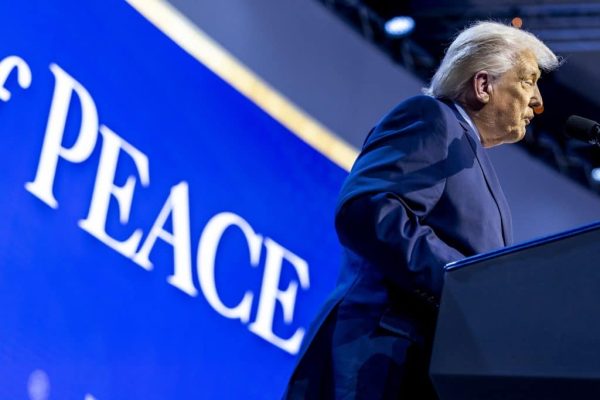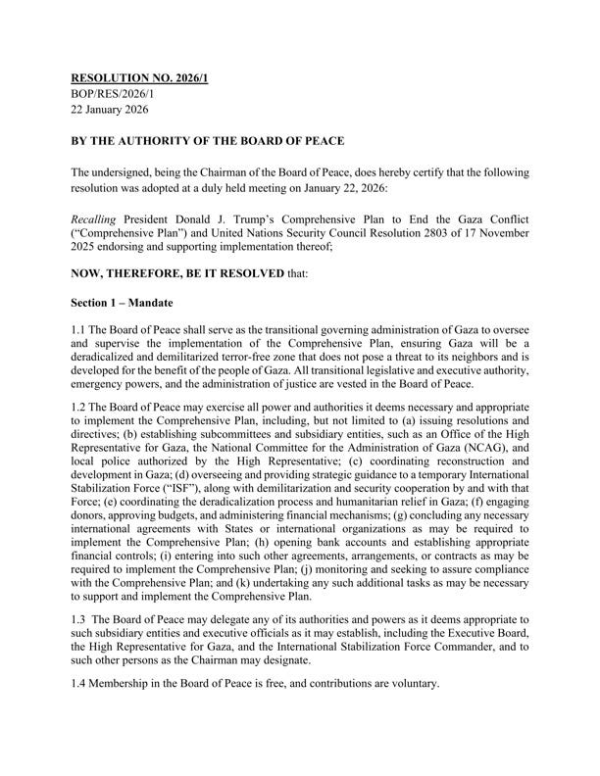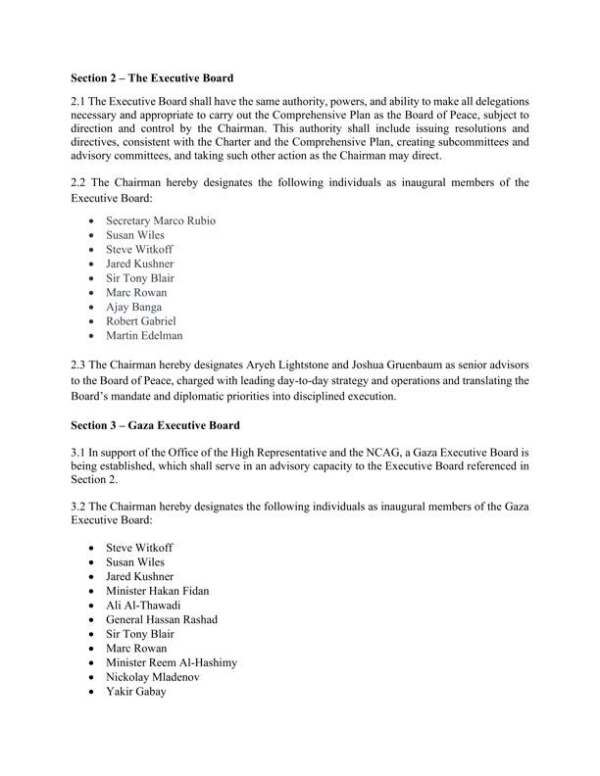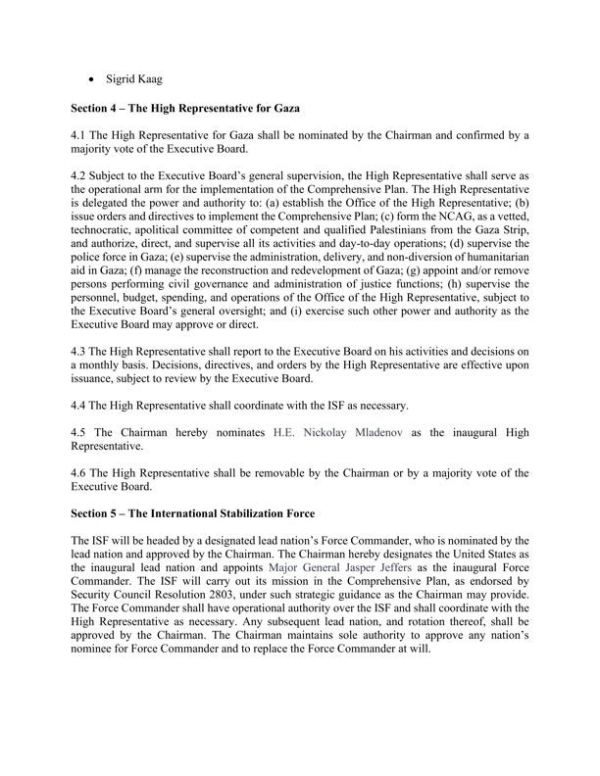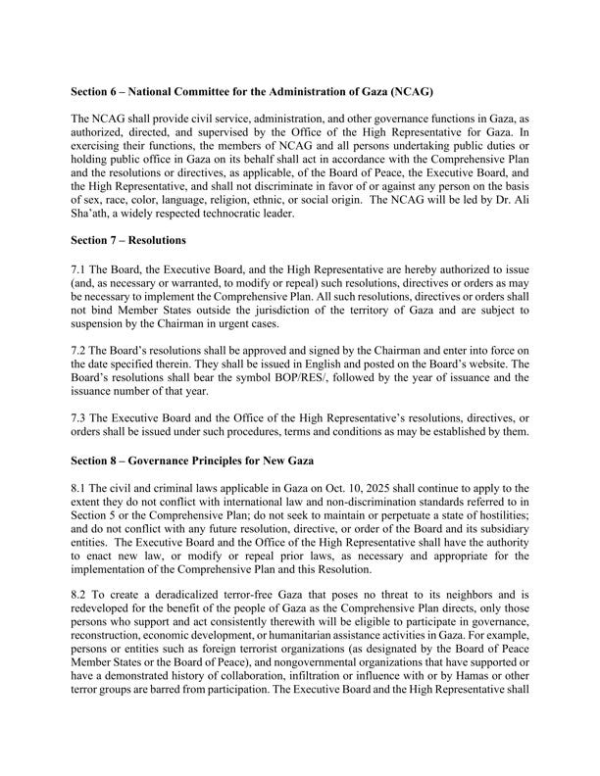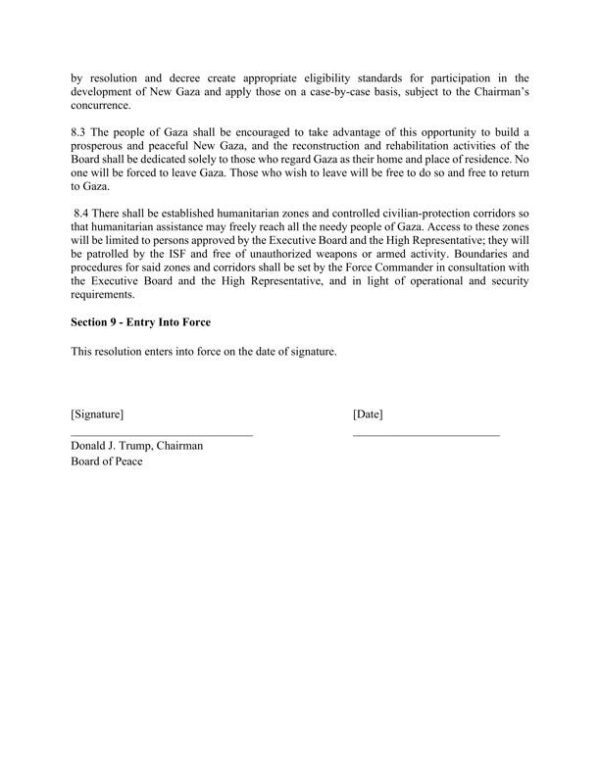We speak to Greek economist Yanis Varoufakis about the United States under Donald Trump and its attempts to reshape the post-World War II international consensus. “Trump has all his work done for him by placid European centrists who went along with the policy of trashing international law and creating the circumstances for him to create his private company and say, ‘Right, I’m taking over the world,’” laments Varoufakis as he draws a connection between Trump’s pay-to-play diplomacy and the mercantalist policies of European colonial powers. Varoufakis comments on plans for the reoccupation of Gaza by the U.S.-led “Board of Peace,” which signed its founding charter this week; Trump’s designs on the Danish territory of Greenland; and European leaders’ ineffectual, largely symbolic resistance to Trump’s assertion of U.S. supremacy on the world stage.
Transcript
This is a rush transcript. Copy may not be in its final form.
NERMEEN SHAIKH: President Trump hosted an elaborate signing ceremony today in Davos for his so-called Board of Peace. Over 20 countries have joined, but that number is expected to increase. Many critics fear the board could undermine the United Nations. Trump will serve as chairman indefinitely. Each permanent seat has a price tag of a billion dollars, which Trump will control. Trump initially proposed the board to oversee Gaza, but said he now envisions a much broader vision.
PRESIDENT DONALD TRUMP: Once this board is completely formed, we can do pretty much whatever we want to do. And we’ll do it in conjunction with the United Nations. You know, I’ve always said, the United Nations has got tremendous potential — has not used it, but there’s tremendous potential in the United Nations. You know, on the eight wars that I ended, I never spoke to the United Nations about any of them. And you would think that I should have. You would think they could have done those eight wars, but they couldn’t have. And they tried, I guess, in some of them, but they didn’t try hard enough.
This is for the world. As everyone can see today, the first steps toward a brighter day for the Middle East and a much safer future for the world are unfolding right before your very eyes, because I’m calling the world a region. The world is a region. We’re going to have peace in the world. And, boy, would that be a great legacy for all of us. Everybody in this room is a star, or you wouldn’t be here. There’s a reason that you’re here. And you’re all stars.
NERMEEN SHAIKH: The charter makes no mention of Gaza.
Countries that have joined the board so far include many right-wing or authoritarian governments, including Argentina, Azerbaijan, Bahrain, Belarus, Egypt, Indonesia, Morocco, Saudi Arabia, Turkey and the United Arab Emirates. Hungary is the only European country to sign on. France, Norway, Slovenia, Sweden and the United Kingdom have all said they will not join.
Trump has invited Israeli Prime Minister Benjamin Netanyahu and Russian President Vladimir Putin to join the Board of Peace. The Israeli press reports Netanyahu opted not to fly to Switzerland, out of fear that he would be arrested for war crimes. During the Board of Peace ceremony, Trump also suggested a settlement on the Ukraine war is, quote, “coming very soon.”
Also at today’s signing ceremony, President Trump’s son-in-law and senior White House adviser Jared Kushner unveiled the board’s new $25 billion “master plan” for a new Gaza.
JARED KUSHNER: So, we did a master plan. We brought in — I thank you — Yakir Gabay, who’s one of the most successful real estate developers and brilliant people I know. He’s volunteered to do this not for profit, really because of his heart. He wants to do this. And we’ve developed ways to redevelop Gaza.
Gaza, as President Trump’s been saying, has amazing potential. And this is for the people of Gaza. We’ve developed it into zones. In the beginning, we were toying with the idea of saying, “Let’s build a free zone, and then we have a Hamas zone.” And then we said, “You know what? Let’s just plan for plan for catastrophic success.” We — Hamas signed a deal to demilitarize. That is what we are going to enforce.
People ask us what our plan B is. We do not have a plan B. We have a plan. We signed an agreement. We are all committed to making that agreement work. There’s a master plan. We’ll be doing it in phasing. In the Middle East, they build cities like this in — you know, 2-3 million people, they build this in three years. And so, stuff like this is very doable, if we make it happen.
Rafah, we’ll start with. This will show a lot of workforce housing. We think this could be done in two, three years. We’ve already started removing the rubble and doing some of the demolition. And then, New Gaza. It could be a hope. It could be a destination, have a lot of industry, and really be a place that the people there can thrive.
AMY GOODMAN: That’s former — that is former White House adviser, Trump’s son-in-law Jared Kushner.
Meanwhile, President Trump has backed down on his threats to take Greenland from Denmark and to impose tariffs on European allies who oppose his plans — at least for now. After a dramatic day at the World Economic Forum in Davos Wednesday, Trump announced the “framework of a future deal” had been reached for Greenland and the entire Arctic region. During his speech, Trump repeatedly referred to Iceland, instead of Greenland.
PRESIDENT DONALD TRUMP: Iceland, that I can tell you, I mean, our stock market took the first dip yesterday because of Iceland. So Iceland has already cost us a lot of money. But that dip is peanuts compared to what it’s gone up.
AMY GOODMAN: Trump’s comment came after he met with NATO Secretary General Mark Rutte. Details of the framework have not been made public. Trump said the deal would involve the United States getting mineral rights and for Greenland to be used for Trump’s proposed “Golden Dome” missile defense system. Rutte was asked about the deal by journalist Fareed Zakaria.
FAREED ZAKARIA: Does all of this give you a sense that the United States and the current administration is truly committed to the support of Ukraine and to the independence and sovereignty of Ukraine?
MARK RUTTE: Yes. And when it comes to the Arctic, President Trump, in his first term, already said we should spend more time and more energy on the Arctic and to defend the Arctic against the Russians and the Chinese, because the sea lanes are opening up. Greenland, yes. Not only Greenland, it is the whole Arctic, seven nations in NATO, one outside NATO, Russia. And these seven have to defend themselves against Russia and China.
AMY GOODMAN: For more, we go to Athens, Greece, where we’re joined by Yanis Varoufakis, former finance minister of Greece, author of several books, including Technofeudalism: What Killed Capitalism.
Yanis, welcome back to Democracy Now! When we got in touch with you yesterday, the top news was President Trump backing off saying he would invade Greenland, and also dropping the tariffs. But a lot has happened in the ensuing minutes, or, I should say, hours, as it so happens every day now, this fire hose of news. Just as we are broadcasting, President Trump has held a charter signing ceremony for the so-called Board of Peace. While the Board of Peace he referred to was initially for Gaza, he now says it’s the region — it will deal with the region of the world. He said, yes, “The world is a region.” And he was surrounded by everyone from the head of Argentina, Milei, had Belarus sign, Morocco, Saudi Arabia. The European community, meanwhile, is meeting in Brussels, the 27 nations. It’s very interesting to note. Is he having this gathering in Davos to take away from this image of the European community, fiercely critical of what he has done just alone in these last few days, imposing the sanctions, saying he would invade Greenland, what he called Iceland, and then taking it all back?
YANIS VAROUFAKIS: Well, what we see is the geopolitical version of Steve Bannon’s infamous policy or tactic of flooding the zone. He abducts Maduro from Venezuela. Before we have a chance to think about it, he talks about Greenland. Then he threatens military action in Greenland. Then he takes it all back. Then he abandons the Board of Peace. Then he brings it back and, you know, proposes it as a substitute for the United Nations.
I think that, you know, it’s very easy to dismiss this as a toddler on LSD, but I think that behind this tactic, we have the Steve Bannon strategy of making the rest of us, the rest of the world, you know, sink into a black hole of uncertainty, while he’s getting on with the business of enriching himself, a ruling class of tech lords around him, and solidifying his power and keeping his divided MAGA movement somehow pacified.
NERMEEN SHAIKH: And, Yanis, already before today’s developments, you had called the Board of Peace, quote, “one of the most despicable developments” in your lifetime. So, if you could explain what your sense is now, given that we know more about the contours of this board, in particular the fact that the charter itself made no mention of Gaza, though it was supposed to be a Board of Peace for Gaza?
YANIS VAROUFAKIS: When I first heard about the board of Gaza, months ago, it made me think that, you know, this is something that Philip K. Dick would invent — part of science fiction — if he was on really bad drugs. The reason why it is a monstrous idea is because — think about it — what he initially proposed — and this is still going on — is that a private company, headed by him for life, will annex the occupied land of Gaza. And interestingly, the Europeans, they went along with that, because they thought it was only about Gaza. But it wasn’t. They were wrong. It was much bigger than that. It was all about, as we now see, replacing the international order that came out of 1945, the carnage of the Second World War, the Holocaust and so on.
Look, the United Nations, undoubtedly, has proven itself particularly weak. He said so, didn’t he? We heard him say, “Oh, they haven’t sorted out any wars.” Well, there’s a reason for that: because people like him keep vetoing any serious peace proposal at the level of the Security Council.
But the whole point of what he’s doing is essentially to create an unholy alliance of big business. This is — you know, this is what the tech lords, you know, Peter Thiel, various members of this cabal that were with him during his inauguration, the second inauguration — this is a new ideology, the ideology of corporations resembling, if you want, if you want to go back centuries ago, the Dutch East India Company or the British East India Company. That monstrous — how shall I put it? — nightmare is now coming back, in very flimsy terms, with a charter which is not worth the paper it’s written on. But this is the whole intention. This is where we’re being pushed.
NERMEEN SHAIKH: And, Yanis, let’s just talk about who is on this, the executive committee of this board. It includes, of course, Trump’s son-in-law Jared Kushner, Secretary of State Marco Rubio, as well as the former British Prime Minister Tony Blair. Now, the French President Emmanuel Macron refused to join, warning that it could undermine the United Nations. But Trump will not only serve as the board’s chair indefinitely, he will also have veto power over all the board’s decisions. I mean, what do you think that means, especially in light of critics, like yourself, saying that this might actually be an organization that supersedes the United Nations, or, in fact, makes the U.N. entirely redundant?
YANIS VAROUFAKIS: Well, this is not a matter of interpretation. I mean, it’s what Trump wants. It’s what he says he wants to do. He says, “OK, well, maybe we can keep the United Nations as a rubber stamp.” You know, after all, he did push through his proposal of this Board of Peace for Gaza through the Security Council, with the complicity of the French and the British, who are now realizing that this is not just about, you know, Brown people in the developing world. It’s not just about the Palestinians, whom they themselves condemned to genocide. It’s about them, as well. So, they’re beginning to understand that they’re getting their comeuppance.
But, you know, when President Macron, for instance — you mentioned that — says, “Oh, but, you know, your Board of Peace is going to undermine the United Nations,” no, where were — where was President Macron when Israel was, effectively, wiping the floor clean with the Charter of the United Nations, with the decisions of International Court of Justice ordering Israel to withdraw from Occupied Territories? The answer is, people like President Macron and Prime Minister Keir Starmer of Britain and Friedrich Merz, the chancellor of Germany, were aiding and abetting this trashing of the United Nations. So, in a sense, Trump has all his work done for him by placid European centrists who went along with the policy of trashing international law and creating the circumstances for him to create his private company and say — right? — “I’m taking over the world.”
NERMEEN SHAIKH: Yanis, but what about this fact of a billion dollars? Each member will pay a billion dollars to join. Now, this is unprecedented as far as international organizations go. Which international organizations require payment from member states?
AMY GOODMAN: And, of course, Trump will all —
YANIS VAROUFAKIS: Well, it’s not unprecedented.
AMY GOODMAN: — will be in charge of that money.
YANIS VAROUFAKIS: It’s not at all unprecedented. It’s how capitalism made its first fluttering moves. Remember the East India Company, both the Dutch version and the British version? How did it happen? In the case of the British East India Company, while Shakespeare was writing a play somewhere in London, businessmen got together, and they chipped in the equivalent of a billion pounds or dollars, or whatever, each to create that company. And that company, in the end — let us not forget that — was the first colonizer. They had 200,000 soldiers under their command. They took over East India. They took over Indonesia. And it was only later that states came and effectively nationalized colonialism.
So, we are going back many centuries. It’s not — maybe it’s unprecedented given the narrative that we have been led to believe falsely, that it’s now permanent, over the last 60, 70 years. But, essentially, Trump is, with the complicity of the Europeans, at least in terms of their deeds, if not their words, is trying to maintain American hegemony, the hegemony of a very tiny ruling class of the United States, not of the people of the United States, over the world.
AMY GOODMAN: It’s very interesting that Commerce Secretary Howard Lutnick was heckled at the World Economic Forum dinner earlier this week, with the European Central Bank President Christine Lagarde walking out. Lutnick had written in an opinion piece in the Financial Times earlier this week, saying, “We’re not going to Davos to uphold the status quo. We’re going to confront it head-on. … We are here at Davos to make one thing crystal clear: With President Trump, capitalism has a new sheriff in town.” Yanis Varoufakis?
YANIS VAROUFAKIS: Well, it is interesting, isn’t it? What he said to them was, “We’re not here to join your multilateral global order, which we Americans created in the first place, and you became beneficiaries of that. We’re here to bury it.”
You know, Christine Lagarde walked out. But where did she walk towards? Back to Frankfurt, to the European Central Bank, which is steadfastly refusing to do anything in order to challenge the hegemony of the U.S. dollar. Because, you know, here in Europe, we have manufactured a European Union and a monetary union, for decades now, in a manner that it was always subservient to the United States, always acquiescent towards the dollar zone, towards the authority of the Federal Reserve. Never, never did the Europeans try to create — it’s not that they tried and failed. They never wanted to create a sustainable, independent Europe. And now they are running around like headless chicken, bleeding around, you know, in apoplexy, but without a plan. There is no European plan, for instance, for Ukraine.
There is no — what happened when, you know, President Trump ordered the Marines to go into Venezuela and abduct Maduro, whatever one thinks about Maduro? Did they protest the violation of international law? No, because they, again, like in the case of the Board of Peace in Gaza, they thought that this is for Brown people, you know, for people in the developing world. So, this is — you know, as a European, I am far more cross with our own leaders here, who, you know, now protest. But it’s too late.
AMY GOODMAN: Very interesting to see Jared Kushner giving, center stage, a PowerPoint presentation on what they would do with Gaza — you know, no Palestinians included here — and President Trump himself saying today, describing Gaza as a “beautiful piece of property,” said he is a “real estate person at heart.” As we begin to wrap up, your comments on what this means for Israel and Gaza, and Netanyahu not coming to stand with his friend, President Trump, in Davos, concerned that he could be arrested for war crimes when he comes into Switzerland?
YANIS VAROUFAKIS: Well, that’s the only silver lining, that something keeps him up at night. He’s a war criminal, and he should be kept up at night.
But just to answer your question directly, what this Board of Peace plan for Gaza is is the completion of the genocide. This is the logical limit of what Israel has been doing, to treat Gaza as a piece of real estate. Palestinians don’t exist. They can only exist as servants, as in the same way that under South African apartheid, the Blacks were tolerated only to the extent that they didn’t choose where to live, that they were confined in Bantustans, and they were beaten up the moment they asserted their right to exist and to breathe as human beings.
NERMEEN SHAIKH: And finally, Yanis, if you could talk about the latest with respect to Trump’s comments on Greenland, withdrawing his threat to impose tariffs on Europe, and what the latest is about these talks that he says the framework of an agreement that’s been reached with NATO on Greenland’s status?
YANIS VAROUFAKIS: Well, it seems to me that he’s retreated slightly, from a tactical perspective, from saying, “Greenland is going to be mine,” like Alaska was sold by Russia to the United States. Now he’s shifting to saying, “I’m going to have freehold. I’m going to have something along the lines of Guantánamo Bay,” a permanent freehold or leasehold with Denmark. But, of course, you know, we will probably have to revisit this conversation tomorrow or the day after, because this is not a settled agreement.
AMY GOODMAN: We want to thank you very much for being with us. We’re going to end with the comments of the Canadian Prime Minister Mark Carney addressing world leaders at Davos.
PRIME MINISTER MARK CARNEY: Let me be direct. We are in the midst of a rupture, not a transition. Over the past two decades, a series of crises in finance, health, energy and geopolitics have laid bare the risks of extreme global integration. But more recently, great powers have begun using economic integration as weapons.
AMY GOODMAN: Yanis Varoufakis, we just have 30 seconds. Your response, as he talks about the great disruption at this point?
YANIS VAROUFAKIS: A brilliant speech, a very good diagnosis of where we are, and a terrible recipe for what we should be doing.
AMY GOODMAN: Yanis Varoufakis, we thank you so much for being with us, a former finance minister of Greece. Most recent book is titled Raise Your Soul: A Personal History of Resistance. And we will have you back on to talk about that book, co-founder of Progressive International.Email


